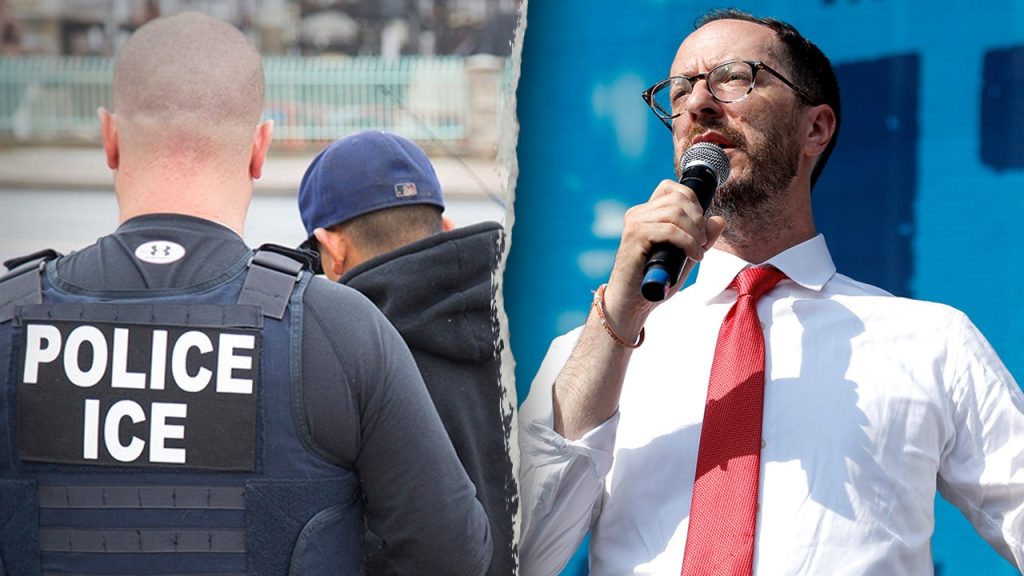In recent operations conducted by U.S. Immigration and Customs Enforcement (ICE) in Nashville, law enforcement arrested a convicted child sex predator and an alleged member of the violent Venezuelan gang Tren de Aragua, among others. These actions, however, have stirred controversy as Nashville’s Mayor, Freddie O’Connell, criticized the federal initiative, asserting that such enforcement actions could potentially undermine community safety and foster fear among residents. O’Connell expressed deep concern over the federal government’s approach to immigration enforcement, especially in the absence of any involvement from local law enforcement.
| Article Subheadings |
|---|
| 1) Background of the Operations in Nashville |
| 2) Mayor O’Connell’s Response to ICE Actions |
| 3) Details of the Arrests Made |
| 4) Implications for Local Safety |
| 5) Overall Impact on Immigration Policy Debate |
Background of the Operations in Nashville
In the latest wave of immigration enforcement, ICE carried out significant operations aimed at capturing individuals with criminal backgrounds. These operations typically target illegal immigrants who have committed crimes, thereby raising public safety concerns. Nashville, a vibrant city known for its music scene and cultural heritage, became the focus of this enforcement. This latest round of arrests aligns with the broader immigration policies pushed by federal authorities, particularly during administrations prioritizing stringent law enforcement against illegal immigration. However, these strategies have attracted widespread criticism, especially from local leaders who argue that such tactics disproportionately affect marginalized communities and do not necessarily enhance public safety.
Mayor O’Connell’s Response to ICE Actions
Nashville’s Mayor Freddie O’Connell has publicly denounced the actions taken by ICE, emphasizing that these federal operations do not contribute to the safety of the Nashville community. In a letter addressed to city officials, O’Connell articulated concerns that enforcement actions instill fear among residents, thus hindering the hesitance to report crimes or seek help from local authorities. He expressed that the city’s police department does not possess federal immigration enforcement authority and is not trained for such duties. O’Connell’s statements underscore a divide between local and federal interests regarding immigration enforcement, as local officials aim to foster community trust rather than enforce harsh immigration policies.
Details of the Arrests Made
ICE operations in Nashville resulted in several notable arrests. Among those detained was a convicted child sex predator, whose prior convictions raised alarms about community safety. Additionally, an alleged gang member linked to Tren de Aragua—an organization notorious for its violent activities in both the U.S. and Latin America—was apprehended during the operations. Other individuals included those charged with aggravated assault and various drug offenses. These arrests were part of a concerted effort by the Department of Homeland Security (DHS) to crack down on individuals who pose a risk to public safety. While ICE claims that such operations are essential to national security, local officials like O’Connell argue that these sweeping measures disrupt community cohesion without substantive evidence of increased safety.
Implications for Local Safety
The arrests made by ICE have broad implications for perceptions of safety in Nashville. Mayor O’Connell’s objections point to a critical concern: the nature of ICE operations can discourage community members, particularly those from immigrant backgrounds, from engaging with law enforcement. When residents fear deportation or harassment, they are less likely to report crimes or cooperate with police investigations, which can ultimately compromise public safety. The Mayor emphasized that the environment of fear surrounding federal enforcement can lead to underreporting of crimes and dissatisfaction with local authorities. This dynamic raises questions on how effective federal immigration policies are at truly enhancing public safety or instead reinforcing a cycle of fear.
Overall Impact on Immigration Policy Debate
The controversy surrounding the ICE operations in Nashville feeds into the larger national debate on immigration policies. Advocates for immigration reform argue for a more humane approach that emphasizes integration and support for vulnerable communities, as opposed to punitive measures that prioritize enforcement. The conflict between local leadership and federal immigration agencies reveals the complexities involved in crafting policies that are both effective in combating crime and respectful of individual rights. As this discourse continues, localities may push back harder against federal efforts that they believe do not serve the interests of their communities, suggesting a long-term shift in how immigration is managed at both local and national levels.
| No. | Key Points |
|---|---|
| 1 | ICE conducted operations in Nashville, leading to multiple arrests, including a child sex predator. |
| 2 | Mayor O’Connell criticized the federal raids, stating they do not enhance safety. |
| 3 | Community fear surrounding these operations may discourage residents from engaging with law enforcement. |
| 4 | The arrests align with federal efforts to crack down on individuals posing risks to public safety. |
| 5 | The incident highlights the divide between local authorities and federal immigration policies. |
Summary
In the context of ongoing immigration debates, the recent ICE operations in Nashville represent the tensions between federal enforcement and local community safety. Mayor Freddie O’Connell has raised vital concerns about the negative implications of these federal actions, which could erode the trust between residents and law enforcement. As communities navigate the complexities of immigration enforcement, this incident underscores the need for policies that prioritize safety while fostering trust and support within diverse populations.
Frequently Asked Questions
Question: What prompted ICE to conduct operations in Nashville?
The operations were part of a federal initiative aimed at apprehending individuals with criminal backgrounds, including those involved in gang activities and child exploitation.
Question: How has Mayor O’Connell responded to the ICE arrests?
Mayor O’Connell criticized the raids, expressing concern that such actions undermine community safety and instill fear among residents, particularly in immigrant communities.
Question: What are the potential consequences of these ICE operations for local communities?
The operations may discourage residents from reporting crimes or cooperating with law enforcement, contributing to a cycle of mistrust and potentially undermining public safety.
